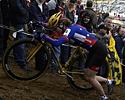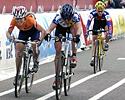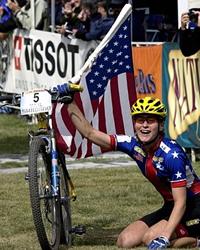
Recently on Cyclingnews.com |
MTB index page for all MTB content
An interview with Alison Dunlap, March 5, 2008
Cycling into retirement
Just over two years after retirement from a career that included two trips to the Olympic Games and a World Championship mountain bike cross country title, Alison Dunlap remains involved in cycling. Cyclingnews' Sue George talked with Dunlap at a recent women's cycling conference at the Olympic Training Center in Colorado Springs, Colorado, where retired pro served as a guest on the elite athlete panel.
"There are parts of racing I miss," said Dunlap thinking of her career which spanned four years as a collegiate athlete and continued at an elite level from 1992 to the end of the 2005. "I miss the friendships and hanging out with the team talking about the course and commiserating afterward. But what I don't miss is the training and the stress of racing and learning how to ride some of these really hard World Cup courses, the travel, dealing with the rain and the mud.
"So 90% I don't miss at all. 10% I will always love and will probably always miss that little bit," said the 38 year-old.
Dunlap is still a regular on the National Mountain Bike Series, but now she plays a different role. "I'm there doing racing clinics," she said. "I love watching the racing. It's really fun because I know how hard it is and I don't have any desire to be out there. It's great to watch the chaos."
Still an official member of the Luna Women's Mountain Bike Team, Dunlap said, "I go to some of the Luna ambassador teams around the country and help them run clinics with the local women. I also do some media stuff - running race reports, press releases and doing media tracking."
A day in the life
"My day is so much busier than it ever was," said the long-time Colorado Springs resident. "I usually spend a few hours on the computer in the morning, emailing athletes, updating programs, talking to USA Cycling about selection. I'm on the selection committee so I get lots of emails about Olympic selection. I work with USADA, too."
"I have the total master's syndrome now. As soon as I get on the bike, it's all about going hard. Now it's all about burning calories."-Alison Dunlap comments on her post-retirement riding. |
Dunlap said she tries to squeeze in a daily ride. "But the ride time is much less. Most of the time I can justify about two hours and if I get more, I'm excited. Usually I can justify an hour or an hour and a half."
Laughing at herself, Dunlap chuckled, "I have the total master's syndrome now. As soon as I get on the bike, it's all about going hard. Now it's all about burning calories. If I have time to ride my bike, I don't want to waste it on a recovery day. So I'm always riding hard."
"I used to make fun of those riders when I trained, but now I'm one of them, so it's pretty ironic. But I'm not racing so it doesn't matter. I ride to stay fit. I still love to eat. If I didn't ride my bike, I'd be 180 pounds."
Overcoming obstacles

|
"Injuries are the worst for an athlete to deal with," said Dunlap, who should know since she overcame two serious ones during her long road and mountain bike career.
"In 1995, I had a pretty bad head injury that took me out for the whole summer. That was extremely traumatic and it was the year before the Olympics and to miss that whole season could have been the end of my Olympic dream, but it wasn't." Dunlap went on to make the team in 1996 and finish 37th in the road race Atlanta - a result she considered "disappointing" on her website www.alisondunlap.com.
Dunlap also represented the US at the Olympics in 2000 in Sydney, where she finished seventh. In 2001, she won the UCI World Mountain Bike Championships in the cross country when they were held on home turf in Vail, Colorado. She looks back at her Olympic and World accomplishments as her career bests.
She was a serious candidate for another Olympic Games in 2004, but things did not go according to plan. "I got injured again in 2003 and had to have surgery. It was a just a bad crash in a muddy race in West Virginia," she said thinking back to a National Mountain Bike Series event in Snowshoe. "I had a fourth degree AC [acromioclavicular - ed.] separation."
"Again, it was the year before the Olympics in Athens and it actually did knock me out of the Games." Sidelined from competition, Dunlap was unable to collect the UCI points that were so important for making the 2004 US Olympic Team. The battle for selection was between Mary McConneloug and Sue Haywood, with the former making the team.
Staying in touch

|
Dunlap coaches under her own business (for more information, visit www.alisondunlap.com). She sees a wide range of riders and goals.
"I have 14 athletes I am coaching right now," said Dunlap. "I have a woman who is 64 and loves to ride and wants to be strong enough to drop all the guys. I have a guy who is 200 lbs and is down from 300 lbs and is going to try his first beginner mountain bike race."
"Then I coach Kathy Sherwin who is an elite [racer]. She is trying to make the World Championship team."
Dunlap explained why she thinks it's important to find a coach and get some direction. "There is a lot to figure out with the sport. Unless you have a ton of time to read and go online and research coaching, you're really just guessing. You're going to waste a lot of time."
"There are thousands of coaches out there and some are really cheap and some are really expensive. Find one you can afford and find one with whom you get along. That will make the learning curve a lot less painful."
Looking at the next generation of mountain bike heroines, Dunlap said, "I think Georgia Gould will be the next superstar. She is already there nationally, but she needs to make the step up internationally which she will. Last year was her first World Cup season and she made the podium and a couple of top tens which is phenomenal.
"I told her this fall that she needs to not just be thinking about making the Olympic team but about getting a medal. I think she's that talented."
She called team-mate Chloe Forsman "a big talent, but she's still super young. My biggest concern for her is that she has been doing it for so long and it's hard for women to survive form the high school year to college into the pro ranks."
"It's not that she doesn't have the talent. It's hard to make it. She's doing a good job and has good support from the Luna team. She's a talent for the future."
What comes next
No matter where the future takes Dunlap, she can always fall back on what she learned from so many years of elite level competition. Dunlap said that what has served her from cycling is "persevering or knowing that to achieve something takes a lot of work and to have patience."
Dunlap has already had a chance to apply her knowledge firsthand to business. "We started this business - Alison Dunlap adventure camps. It's been an interesting learning curve. You want success right away. You want to make all this money and have all these clients. You want to run clinics all summer. It doesn't happen that way. Just this year, we started paying ourselves a salary. It's like training. You have to have a plan, work at it and it takes awhile."
"I look back on how hard I suffered and how long it took to become a good cyclist and I think 'Yeah, I could accomplish anything if you just apply that same philosophy.'"
Photography
For a thumbnail gallery of these images, click here
Images by AFP
- Alison Dunlap (R) follows Dutchwoman Daphny Van den Brand (L), and German Hanka Kupfernagel © as they battle for second at the cyclo-cross world championships in Zolde in 2002.
- Alison Dunlap pushes her bike during the cyclo-cross world championships in Zolde in 2002.
- Alison Dunlap celebrates after winning the world cross country championships in Vail, Colorado in 2001.

